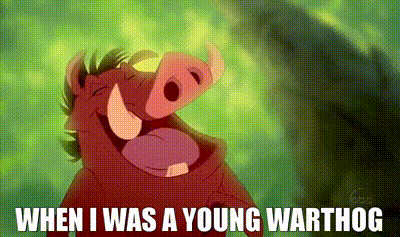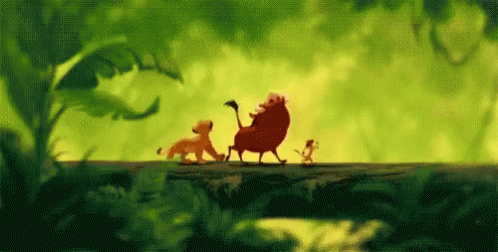Community Advice: Embracing Relationships, Active Listening, and Patience
🎶 WHEN I WAS A YOUNG WARTHOG 🎶
In my first community adjacent role, I oversaw the organization’s legacy forums, which included the flagship product forum.
Yeah, I’m that old in terms of the internet - look at that antiquated verbiage.
One day, my manager asked me to be a stakeholder on a community consolidation project to bring all the disparate communities together.
Did I have any clue what I was doing? Haha, no.
Did I reply with a firm and resounding yes? Indeed.
All of these memories rushed back when someone asked me to share advice for new community professionals.
Along with “WHEN I WAS A YOUNG WARTHOG” on repeat in my mind. I am not an intestinally challenged warthog but that’s the vibe here.
My mind whirred and tried to divide up that knowledge in a way that made sense. I landed on two - skills and general advice.
This week, I am discussing ‘soft’ skills. Next week, ‘hard’ skills. Both will include general advice from yours truly and the awesome people who took time to answer their DMs.
If you’re new, I hope this helps. If you’re a seasoned community professional, take a look at where you are and come tell me what I’m missing. Once again, not just here to talk to myself.
Let’s do this.
Don’t Call Them Soft Skills
I love when people say community is all ‘soft skills’ because these are difficult skills to cultivate and maintain. The ones that really test your soul if I’m honest - relationship development, active listening, and patience (with a side of tenacity).
I use the term “relationship development” while corporate me really wants to use “networking” because it’s less squishy. If you’re struggling with that too, go ahead and call it that. It’s okay, really. Corporate jargon is one wily thing to talk about in another post so I’m going to avoid that rabbit hole for now.
Relationship Development
Community is about the people.
I’m not talking about your members but about internal colleagues aka cross functional collaboration. This includes the usual stakeholders - product, customer success, support, marketing, education, maybe even sales.
It also includes human resources, legal, finance, IT, and even the front office administrative assistant to name a few.
It takes a community to support the community and everyone has a role. Even if they don’t know it. Relationships are crucial for you to be successful. Call it internal networking if that helps. I won’t know and therefore can’t side eye you.
A few tips:
Learn their language and how they work. Each role and department uses different jargon and processes. Listen, ask questions (politely), and learn so you can connect with them.
Share how they help your community when they do so. Did IT help with a vendor hiccup? Thank them and show them. On repeat. This builds trust and lets them know you recognize their effort.
Be patient. This takes time and it doesn’t always need to be a formal situation. Prioritize the main stakeholders and then work your way out to the rest of the organization.
Finally, show up consistently. In corporations, you need to repeat yourself loudly, over and over and over again, to stay at the top of everyone’s minds.
P.S. - Be a human & have a bit of fun.
P.S.S. - You can use the same tips to get to know your members.
Active Listening & Connecting Dots
Every single community professional will say they’re good listener and that’s pretty accurate. We know people want to be heard so we listen.
However, community requires active listening skills.
I’d sum up the definition but here’s a good quote for the Creative Center of Leadership:
“Active listening requires you to listen attentively to a speaker, understand what they’re saying, respond and reflect on what’s being said, and retain the information for later.”
A community professional receives a lot of information so active listening allows you to identify trends, issues, and most importantly, who to go to for help.
Hey-o, building on those relationship development skills. Active listening also develops trust in you as a community professional. Your ability to not only retain information but also do something with it is what makes you stand out.
Then knowing the people to go to make it happen? Priceless. Invaluable. Immaculate.
Patience With A Dash of Tenacity
Community requires an amount of patience you never knew possible. Why? People. Humans. Homo sapiens.
Simultaneously humans will be the best and then make you consider your life choices within the same minute, especially in corporate spaces.
“This was great BUT…”
“I understand BUT…”
You may want to scream, cry, throw something, whatnot, BUT you will have to stop, breathe, and find that patience.
You need to know what the problem is, how to solve it, who to go to, and also scream into the void.
See, it all goes together - those ‘soft’ skills. Except the last one. That’s just a treat.
Tenacity goes with patience because you need an irate inner honey badger who doesn’t like being told ‘no’ or sneers at obstacles. The honey badger just needs patience so it doesn’t destroy what you’re trying to accomplish. Be the honey badger but hone the honey badger.
Last but not least, have patience with yourself. You aren’t going to show up every day as your best self. Neither will your coworkers or your members. Give yourself the grace you’d give them to yourself.
You’re playing the long-term game and, in corporations, that requires patience and tenacity.
Let’s Hear From Cooler People Than Me
I am writing from my point of view so I turned to some community professionals about what they would share.
On relationships:
“During my tenure as a Community Director, I have honed the valuable skill of effectively communicating the benefits of community initiatives to departments beyond my own team. Initially, I operated both independently and collaboratively across different functions to accomplish our goals. However, with time and experience, I recognized the importance of delegation and entrusting other teams with ownership of these initiatives to ensure their success. Today, I see myself more as a Project Manager, orchestrating the efforts of individual contributors to meet project deadlines in a coordinated manner.” - Paola Johnson, she/her, Director of Community and Customer Advocacy, ThoughtSpot
“Trust that people are coming to you in good faith and with good intentions. You can be their trusted space so you need to hold their trust and keep that trust.” -Erin Mikhail Staples, she/her, Developer Experience Engineer
On active listening:
“…I now understand how to speak to different stakeholders instead of believing everyone was interested in the same thing when I started.” -Tim McDonald, he/him, +16 year Community Professional
On patience & tenacity:
“The ability to recognize and communicate when I need help [is important]. I have to relearn this on a regular basis. As community pros, there is no shortage of work on our plates. Practice acknowledging and surfacing when you could use help, when you feel overwhelmed, or when you’d appreciate some feedback.” -Carol Benovic-Bradley, she/her, Community Programs Manager, Reddit
What’s really interesting is that trusting yourself was a constant piece of advice. This is easier said than done but it’s something I will reiterate - you know what you’re doing, you just need to learn how to do it in your current situation.
Trust yourself, you got this, rather it is day one or four thousand and one. If you can’t, come find me. I’m happy to cheer you on.
Alright, my friends, this is way too long so I’ll work on that for next week.
What would you share with other community professionals getting started? Sound off below. See y’all next week!






I love your light. Thank you for sharing this.